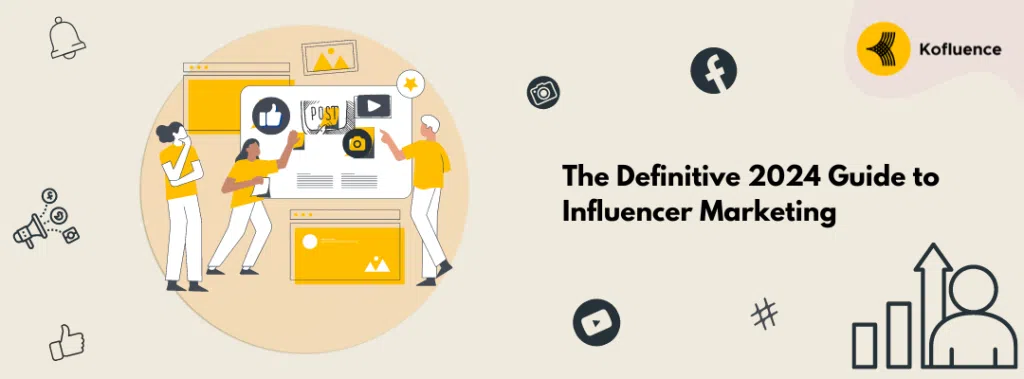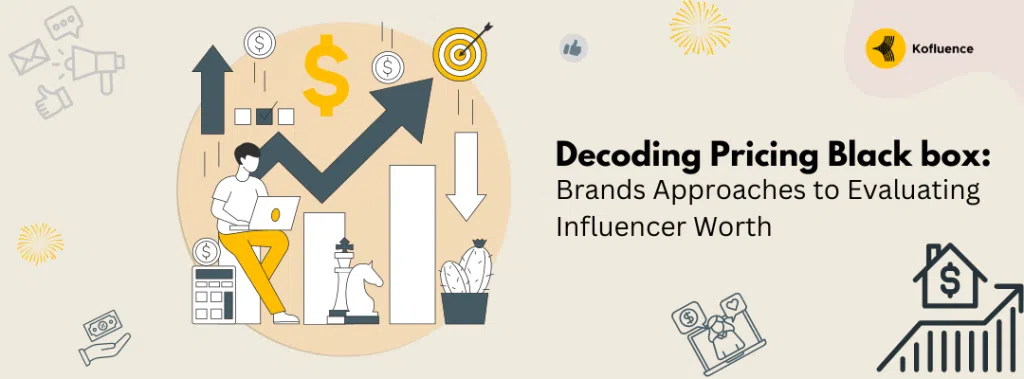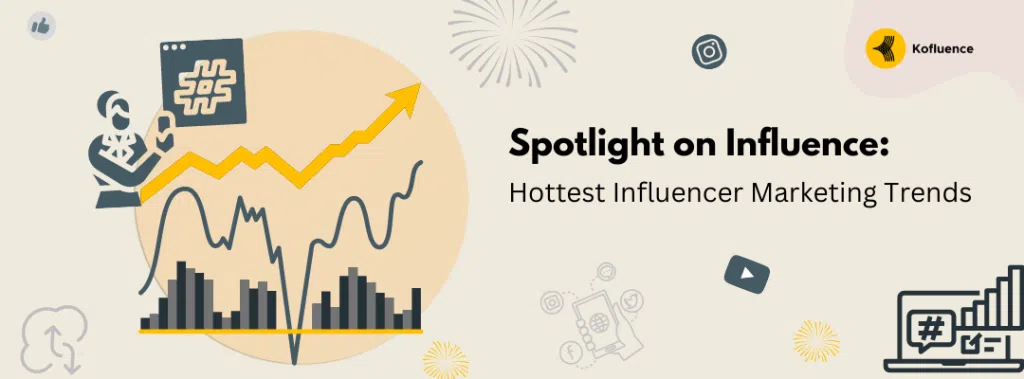Listen to Audio Blog
Table of contents:
Introduction
What is influencer marketing for e-commerce businesses?
How to Accelerate Your E-commerce Business Growth Using Influencer Marketing
Why Your E-Commerce Business Should Use an Influencer Marketing Platform
What is the strategy of influencer marketing for E-commerce brands?
Measuring the Impact of E-commerce Influencer Campaigns
Essential Influencer Marketing Tips for E-commerce Brands
What strategies can businesses employ to effectively overcome challenges in E-commerce Influencer Marketing, particularly when utilizing platforms like Kofluence?
Conclusion
Introduction
Over time we have seen a massive increase in e-commerce usage. But with more and more people and businesses turning to e-commerce, brands are starting to find it difficult to separate their identity from other brands that are their competitors. This has ultimately led to brands turning to work continuously toward their traffic and increasing sales. With the boom of social media, brands realized that if they cannot stand out from the crowd, they can market themselves with the help of influencers who can.
This led to the boom in influencer marketing, now known to be the most effective form of marketing. Here, brands tie up with social media influencers to promote their products. Brands are now aware of the power of social media influencers, who can help brands improve their traffic and sales.
Traffic and sales have a huge impact on conversion rates, which is the percentage of users that will complete a certain action. A good example of this can be the number of people who have watched the post on a brand’s Instagram page and the percentage of them who have brought the brand’s products. Such actions are crucial for an e-commerce company’s success. To increase sales, people must first visit the website.
And for them to become aware of the brand and their website, their reach must be increased on social media with the help of influencer marketing. These factors combined help improve conversion rates, with the hope that there is always an increase in the number of people who buy products after visiting the website. This is why e-commerce businesses must strategize their ways of increasing traffic and sales.
What is influencer marketing for e-commerce businesses?
influencer marketing is now the talk of the town, with every brand stepping into the arena and trying to make a mark of its own. As aforementioned, it is the technique of tying up with social media influencers to promote their brand and products. The main aspect of a good and successful influencer marketing campaign lies in the hands of the influencer themselves and whether they can build genuine connections with their followers and if they are seen as authentic creators.
Brands can take advantage of the influencers’ following to promote their products. Consumers nowadays are not attracted by celebrities endorsing products in between famous television shows, instead, they now look for credibility, authenticity, and relatability.
How to Accelerate Your E-commerce Business Growth Using Influencer Marketing
Selecting the Right Influencers for E-commerce Business
As the saying goes “The right person for the right job”, the same applies to influencer marketing, as brands must choose the right influencers for promoting their products. Various factors such as the demographics of the audience, rate of engagement, relevance to the brand and the industry it is part of, etc. must be kept in mind while searching for the right influencers.
Brands must make sure that the influencer’s content is of good quality and are in line with what the brand offers along with their values and vision. A simple example could be as follows: An influencer who makes content about cars would not be able to promote pressure cookers. And even if they could, the right audience is not being targeted.
Crafting an Effective Influencer Marketing Strategy
Ethics and transparency must be adhered to by brands that are looking to utilize influencer marketing strategies. Aligning the interests of the brand and influencer and advertisement disclaimers on promotional posts are a few examples of said ethics and transparency. Moreover, an influencer marketing campaign should not be ignored after it is put up. Instead, the brand must keep constant track of the campaign’s performance to make improvements when required. These actions also help in creating long-lasting relationships with audiences.
Engaging Influencers and Building Long-term Relationships
E-commerce businesses must focus on creating long-term relationships with not only the audience and consumers but with influencers as well. Repeated promotion of the same brand by influencers will help improve the credibility of the brand, as it shows that the influencer approves of the product.
This leads to increased trust levels and subsequently improves sales. To create these long-lasting relationships with influencers, e-commerce businesses must make sure that there is open communication and transparency between both parties, the expectations that each party has must be accounted for, and influencers are fairly compensated.
Leveraging Different Influencer Marketing Channels
We can say that the influencers that brands collaborate with act as boats that take brands to their desired audience. This is known as content collaboration, where brands take advantage of the influencer’s mastery to provide greater reach and credibility for their content. For example, an e-commerce website that sells clothes can collaborate with a fashion influencer to promote their products for greater reach and credibility.
Measuring and Analyzing Influencer Marketing Success
As stated previously, influencer marketing should not stop at merely releasing content with influencers hoping that there will be a greater reach. Instead, brands must go back to said content and check how well it has faired. They must measure how well the campaign has performed, whether it is for the right audience, what is the conversion rate and in what way they can improve all these factors quantitatively. All this can be done through various metrics and analytical tools. Some of the other important key metrics are engagement, conversion, reach, and sales.
Why Your E-Commerce Business Should Use an Influencer Marketing Platform
Influencer marketing has seen a massive increase over the past few years, albeit the concept has been around for more than a decade. Earlier, the consumer’s attention was grabbed by celebrities endorsing a brand’s products. But nowadays, micro-influencers have better control over their audience as they have a more personal connection. Moreover, influencers themselves have now achieved celebrity status, while their marketing strategies and campaigns are more cost-effective and accessible for e-commerce businesses.
Advantages of using an Influencer Marketing Platform:
Targeted audience:
While e-commerce websites tend to stray away from the key factors that differentiate audiences and their interests, influencers manage to gather audiences of similar demographics, interests, and opinions and it is where they have the upper hand. This form of pin-pointed targeting ensures that the marketing budget is being well spent and the fruits of such efforts are being enjoyed.
Improved credibility:
The biggest advantage of influencer marketing is that e-commerce brands can improve their credibility by collaborating with the right influencers. When influencers are trusted by their audience, it is shared with the brands they promote too. The endorsements done by influencers are proof that they approve of the brand and their products and encourage their audience to try the same. Trust acts as a fuel that helps brands reach the audience’s psyche.
Measurable ROI:
With influencer marketing campaigns, e-commerce brands can quantitatively measure their ROI for enhanced analysis and comparison. Social media platforms also provide information about various KPIs such as engagement rates, conversions, traffic, etc. Such insights are very useful as they provide real-time analysis and actionable insights.
What is the strategy of influencer marketing for E-commerce brands?
There are various components of releasing influencer marketing campaigns that e-commerce businesses must keep in mind. The first and foremost factor is to make sure that the business chooses an influencer whose interests, values, and vision align with those of the business. Brands must collaborate with influencers who can influence their audience, i.e., have better connections with their target audience.
It is also essential to plan out the objectives of the campaign and make sure that the influencer is also on board with the same. Lastly, e-commerce businesses must try not to use influencer marketing as a one-time thing, but must also focus on creating long-lasting relationships with influencers.
There are three essential elements for a successful influencer marketing strategy for e-commerce businesses. The first element is to find influencers whose vision and values are similar to the brands. Relationships between both parties may turn aloof if they are not on the same page.
Measuring the Impact of E-commerce Influencer Campaigns
Measuring the impact of e-commerce influencer campaigns is a multifaceted process that combines both quantitative and qualitative analysis. E-commerce businesses employ a range of metrics and tools to gauge the effectiveness of their influencer collaborations and determine the return on investment (ROI).
Quantitative Metrics:
Engagement Metrics:
Tracking likes, comments, shares, and overall engagement on influencer posts provide insights into the campaign’s reach and resonance. High engagement rates indicate that the content resonated well with the audience.
Click-Through Rates (CTR):
Monitoring the number of users who clicked on the provided links to the e-commerce website can directly measure the campaign’s ability to drive traffic.
Conversion Rates:
Calculating the percentage of website visitors who complete a desired action, such as making a purchase, signing up, or downloading, offers a clear indication of the campaign’s impact on actual sales.
Sales Revenue:
The ultimate goal of e-commerce influencer campaigns is to drive sales. Tracking the increase in sales during and after the campaign period attributes revenue directly to the campaign’s influence.
Cost per Acquisition (CPA):
Dividing the total campaign cost by the number of new customers acquired through the campaign helps evaluate the efficiency of the campaign in terms of cost-effectiveness.
Qualitative Metrics:
Brand Sentiment:
Analyzing comments, reviews, and customer feedback can provide insights into the sentiment surrounding the brand after the influencer campaign. Positive sentiment indicates a successful campaign.
Audience Perception:
Qualitatively assessing how the influencer’s audience responds to the promoted product or service helps in understanding the alignment between the brand and the influencer’s followers.
Content Relevance:
Evaluating how well the influencer’s content fits seamlessly with the brand’s image and messaging is crucial for maintaining brand integrity and authenticity.
Long-Term Impact:
Beyond immediate metrics, observing any sustained increase in brand visibility, follower growth, or customer loyalty can reflect the long-term impact of the influencer campaign.
Influencer Relationship:
Building and nurturing relationships with influencers can lead to repeated collaborations. Assessing the potential for ongoing partnerships can be a valuable qualitative indicator.
Essential Influencer Marketing Tips for E-commerce Brands
In the ever-changing realm of online marketing, leveraging influencer partnerships has become a potent tactic for e-commerce brands. This approach can significantly boost visibility, foster meaningful connections with desired audiences, and ultimately lead to increased sales. However, to achieve success in influencer marketing, a carefully planned and executed strategy is crucial. Here are key pointers for e-commerce brands aiming to optimize their influencer collaborations:
Strategic Alignment:
Opt for influencers whose values, content style, and audience align harmoniously with your brand. Genuine influencer marketing thrives on authenticity, and a seamless fit between the influencer and your brand ensures a more relatable and credible campaign.
Clearly Defined Objectives:
Establish your goals before initiating an influencer campaign. Are you striving to boost brand awareness, drive sales, or introduce a new product? Well-defined objectives enable accurate success measurement.
Micro versus Macro Influencers:
Consider collaborating with both micro and macro influencers. Micro-influencers often possess a highly engaged and specialized following, whereas macro-influencers reach a broader audience. A balanced mix can lead to diverse outcomes.
Compelling Content:
Empower influencers to generate content that resonates with their audience while showcasing your product’s benefits. Encourage creativity and avoid overly scripted content to maintain authenticity.
Seamless Integration:
The promotion of your product should effortlessly blend into the influencer’s content. The more organic and unforced the integration, the more positively it will be embraced by the audience.
What strategies can businesses employ to effectively overcome challenges in E-commerce Influencer Marketing, particularly when utilizing platforms like Kofluence?
Managing influencer expectations and deliverables
Managing influencer expectations and deliverables is crucial for the success of an influencer marketing campaign. It begins with establishing clear objectives and goals and effectively communicating them to the influencers. Providing a detailed brief, including the desired deliverables and key messaging, helps to align their efforts with the brand’s vision.
Regular monitoring and evaluation of the influencers’ performance against the predetermined metrics ensure that the desired outcomes are achieved. Additionally, fostering open and transparent communication throughout the campaign allows both the brand and influencer to address any challenges and make necessary adjustments promptly.
Handling negative feedback or controversies involving influencers
Handling negative feedback or controversies involving influencers can be a daunting task for e-commerce businesses. Brands must have a well-defined crisis communication strategy to address such issues effectively. This involves timely and transparent responses, respectful engagement with customers, and willingness to take responsibility. Additionally, brands must establish guidelines and vet influencers thoroughly to minimize the risk of associating with controversial figures. By handling negative feedback and controversies professionally, businesses can mitigate damage to their reputation and maintain consumer trust in influencer marketing strategies.
Staying updated with evolving trends and regulations in influencer marketing
Staying updated with evolving trends and regulations in influencer marketing is crucial for college-level students aspiring to venture into the e-commerce industry. As this marketing technique gains more popularity, it is essential to stay informed about the latest trends and strategies to ensure a successful campaign.
Additionally, keeping abreast of the evolving regulations surrounding influencer collaborations is vital to avoid legal and ethical issues that may arise. By staying updated, college-level students can effectively navigate this ever-changing landscape and maximize the potential of influencer marketing for e-commerce business growth.
Conclusion
In conclusion, tracking and measuring the influence of influencer marketing on conversion rates is of utmost importance for e-commerce businesses to comprehend the efficacy of their marketing strategies. Employing specialized tools and techniques enables companies to analyze the correlation between influencer marketing campaigns and customer behavior, thus gauging the direct impact on conversion rates.
This data-driven approach empowers businesses to make informed decisions about their influencer collaborations, optimizing marketing endeavors and maximizing sales potential. Kofluence, as a leading influencer marketing platform, offers a robust solution for businesses looking to excel in their influencer collaborations. By partnering with influential individuals on social media, Kofluence enables brands to reach a highly targeted audience, fostering trust and improving conversion rates.
Embracing Kofluence’s services and leveraging influencer marketing as a key strategy allows e-commerce brands to not only drive traffic and boost sales but also stay ahead in this ever-evolving industry. With Kofluence, businesses can confidently navigate the world of influencer marketing and achieve remarkable success.
If you found this blog to be helpful browse through our website for other blogs on similar topics or get in touch with us for your next influencer marketing campaign! Download the Kofluence app and find relevant campaigns catering to your target audience! To opt-in, download the Kofluence app here: iOS users, and Android users.

































